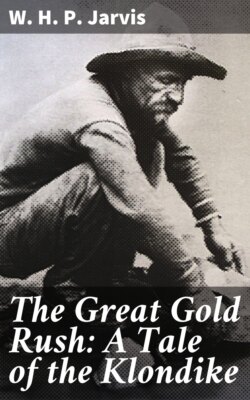Читать книгу The Great Gold Rush: A Tale of the Klondike - W. H. P. Jarvis - Страница 10
На сайте Литреса книга снята с продажи.
THE BEGINNING OF YUKON
ОглавлениеTable of Contents
No more wonderful system of navigation probably exists on the globe than that of the inland passage between Puget Sound and the Lynn Canal, at the head of which are the towns of Skagway and Dyea, the respective ports of the White and the Chilkoot Passes. For ten hundred miles the steamers plying along this route run behind the great barrier of islands, beginning with that of Vancouver and ending at Point Deception. In summer the trip is grand beyond compare; in winter it is full of gloom and awe.
As the ship travels northward the mountains grow greater, the narrow passages narrower, till they develop as canyons, cut only by other canyon-like passages to the sea, or by glacier-ridden valleys from the mainland, whose mighty burdens shimmer in the sunlight as they yield in torrents tributes to the parent ocean. In summer continuous light reigns in the latitude of Skagway, and the traveller entering this weird zone is moved by its uncanny beauty.
Winter was still on the land as the Aleutian ploughed her way northward, and the passengers saw the great walls of rock uplifting to the clammy mantle of low-lying clouds. Here and there Indian villages were passed and Indian graveyards, with flags flying from the stagings, raised six or eight feet from the ground, on which reposed the deceased.
The ship called at Wrangle and unloaded freight and passengers. "This town had a boom during the excitement of the Cassiar twenty years back," remarked Hugh Spencer to Berwick and Bruce, as the three stood on the deck and watched the bustle between the steamer and the wharf.
"Let's stretch our legs up the quay," said George. They went ashore. Squaws were sitting with baskets of their handiwork before them, doing a lively trade with the disembarked passengers. The sales made were mostly of moccasins in beads, and bark canoes adorned with porcupine quills of brightest colours. Hugh stopped before an old squaw and picked up a pair of large mittens with gauntlet attachments. They were made of canvas and lined with red flannel.
"How much?" he inquired.
"Dollar two bits."
"Give you six bits."
"All right."
"Better take a couple of pair each, fellows; there's nothing like them for the trail: look how big the thumbs are." So Hugh and his two companions bought the whole of the squaw's store.
"There's nobody knows how to make mitts for real cold weather like the Siwash. They make the thumbs good and big, so as not to stop circulation; and we'll have some cold weather yet before we get over the summit. But you have to beat the beggars down, as they always ask twice as much as they expect to get. Here we paid only seventy-five cents a pair for these mitts, and the squaw said she wanted a dollar and a quarter for them."
"Are these Siwash[1] Indians?" inquired John.
[1] Corruption of the French sauvage.
"Well, we call them Siwashes; but they don't like it. The real Siwash lives farther south, and the name, I believe, is one of contempt."
"They are different Indians from any I have seen on the plains," said John.
"Oh, yes, very different. I guess their only resemblance is that they are both good only when they are dead."
"You're pretty hard on them," was the remark of the good-natured John.
"Perhaps I am. You see, a tough outfit has been trading up here for years from down the coast; and before that the Russians were here—and they didn't put in most of their time building churches. They found a dollar's worth of hootch would get more from the savages than a dollar's worth of anything else; so they used whisky. The savage, when you find him without the cussedness taught by the white man, makes a pretty good citizen. He may be lazy, but he is honest; and perhaps his laziness is only due to the fact that he has always had a klootch[2] to do chores around, and has never been trained to the white man's ways of working; but let any fellow try following an Indian on snow-shoes for a couple of days, and his ideas soon change. He is not much good with a pick and shovel for sure; but he is A1 on the trail. Another thing about the Indian is that when one has grub they all have grub. This is the way of the Stick Indians inside, and you can cache your grub in their country or leave the things lying around, and they won't touch them."
